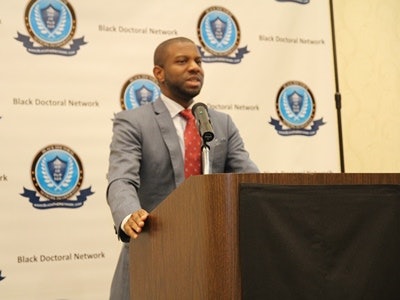ATLANTA — More than 400 participants from various academic disciplines who are in varying stages of their career, spent the weekend networking and sharing their research at the 4th Annual Black Doctoral Network Conference (BDN).
BDN — which was formed nearly five years ago — has become the go-to place for Black faculty and Black graduate students who are pursuing terminal degrees.
“One of the primary reasons the network was formed was to eliminate the isolation that Black scholars feel in their doctoral programs and in their positions,” said Deandra S. Taylor, director of operations for BDN and chair of this year’s conference. “We feel that this has been one of our best conferences so far.”
 Dr. Ivory A. Toldson delivered the keynote address at the 4th Annual Black Doctoral Network Conference in Atlanta. (Photo courtesy of Sedric Walker)
Dr. Ivory A. Toldson delivered the keynote address at the 4th Annual Black Doctoral Network Conference in Atlanta. (Photo courtesy of Sedric Walker)Over the years, BDN — which invites colleges and universities to become members — and encourages participation from undergraduate, graduate and university professionals from all disciplines—has caught the eye of prominent academicians who have lent their support to the growing network. Past conference speakers have included Dr. Cornel West, Dr. William Julius Wilson, Dr. Tricia Rose and Dr. Khalil Gibran Muhammad.
This year’s conference was titled “Changing Research for a Changing World,” and featured Dr. Patricia Hill Collins, a Distinguished University Professor of Sociology at the University of Maryland, College Park; Dr. Ivory A. Toldson, the president and CEO of the QEM Network and a professor of counseling psychology at Howard University; and Dr. Joy DeGrury, a recognized researcher and lecturer whose book Post Traumatic Slave Syndrome—America’s Legacy of Enduring Injury and Healing has become a popular text.
A variety of panel sessions focused on topics ranging from increasing diversity in graduate education to mentorship and educational leadership for Black Students. Participants had the opportunity to hear from veteran educators like Dr. Julianne Malveaux, who spent five years as president of Bennett College, a historically Black college for women located in Greensboro, N.C.
In the aftermath of major protests on college campuses over the past year, participants who attended this year’s conference argue that colleges and universities need to step up their efforts to recruit and retain Black faculty.
“We often hear that they can’t find Black faculty,” said Malveaux, who appeared on a panel focused on diversity and inclusion at the university level. “But that’s not true. They’re right here.”
More than 30 colleges and universities participated in the Graduate and Career Recruitment Fair and piqued the interest of several undergraduate student participants who have aspirations of going on to graduate school and someday joining the professoriate.
Timothy Bediako, a senior at University of Texas, Austin was among the group of undergraduates who was showcasing his research on Amoebiasis—a parasitic infection of the colon—at the research poster competition.
“I am receiving some great feedback on my research,” said Bediako, who plans to go on to medical school. “It has been amazing to be at a conference where so many people look like me.”
Melissa James, an Africana Studies senior at Rutgers University and a Ronald McNair Scholar was also in attendance. She said that her participation in the conference has helped her to network and connect with others who’ve traveled along a similar place.
“Being here has made me realize that my goals are possible,” said James, who plans to pursue a Ph.D. in African American Studies and has submitted applications to a variety of top-tier colleges and universities, including Yale, University of Massachusetts, Amherst and the University of California, Berkeley. “I never felt that I had been prepared to pursue a Ph.D. so it’s been great meeting professors and other researchers who are working in the field that I’m interested in.”
The focus on undergraduates and mentorship is one of the values of the BDN, said Atiya S. Strothers, a doctoral student at Rutgers University and a member of the conference planning committee.
“These undergraduates benefit from the mentorship and that creates a pipeline and a pathway,” said Strothers. “I am excited about their success and knowledge and that they are able to present their research at such a young age.”
Jamal Eric Watson can be reached at [email protected]. You can follow him on Twitter @jamalericwatson



















